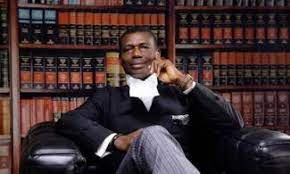EFCC, YAHAYA BELLO AND THE LAW
Sponsored Images




By Ebun-Olu Adegboruwa, SAN
He was not the original candidate of the All Progressives Congress for the governorship election in Kogi State in 2015, having lost the governorship primary election to Abubakar Audu. But fate smiled on Yahaya Bello, who was eventually chosen by the party to inherit the 240, 861 votes polled by Abubakar Audu because the latter died on the very day of the election, even before the result was announced. The main election was not without some controversies as the electoral body declared it inconclusive. At the end of the supplementary election, Bello was declared the winner with the total votes of 247,742 ahead of his very close rival, Idris Wada, who polled 204,877 votes. It was a very close shave for Bello, who was eventually sworn in as the governor. The optimism was very high, for very many reasons. First, Bello was then the youngest governor in Nigeria, at age forty. Second, he was the first product of the 6-3-3-4 educational system to be elected as governor. Third, as a graduate of accounting, the expectation was for prudent management of the resources of the State for positive results. Bello would go through a very tough legal battle to defend his mandate up to the Supreme Court. After his secondary school, Yahaya Bello enrolled for ‘A’ level examinations at the Kaduna State Polytechnic in 1995 and was admitted into Ahmadu Bello University in 1996 to study accounting, from where he graduated in 1999, the same year Nigeria returned to democracy after many years of military dictatorship. This background information on Bello is important given the turn of events in Kogi State from 2016 to 2024.
Bello’s tenure as the governor of Kogi State was as tempestuous as it was dramatic. The State became heavily militarized, transforming into a hideout for terrorists who were being chased from the core North. There were cases of politically motivated assassinations, unresolved murders and political persecutions, not sparing even judicial officers.
As a sitting governor, section 308 (1) of the Constitution of the Federal Republic of Nigeria, 1999 as amended clothed Bello with absolute immunity in the following words:
“(1) Notwithstanding anything to the contrary in this Constitution, but subject to subsection (2) of this section –
(a) no civil or criminal proceedings shall be instituted or continued against a person to whom this section applies during his period of office;
(b) a person to whom this section applies shall not be arrested or imprisoned during that period either in pursuance of the process of any court or otherwise; and
(c) no process of any court requiring or compelling the appearance of a person to whom this section applies, shall be applied for or issued.”
Bello took this as licence to become an emperor over the people and affairs of Kogi State. Bello was beyond rebuke of any sort, describing himself as a white lion. In this state, political opponents were hounded into compulsory exile, as Bello would not brook any opposition as the helmsman in charge. We were regaled with videos of Bello in the gym on regular workout sessions and constantly reminding us that as a boxer, he could dare any opponent. With this commando style of leadership, Bello was able to secure his second tenure in office, even when there were no tangible efforts in place in Kogi to warrant such blanket expression of confidence in the governor. The first major controversy between Bello and the Economic and Financial Crimes Commission was the allegation that a whopping N20B of the resources of Kogi State was found in a particular bank account. Though this was vehemently denied by Bello, the matter eventually ended in court. This was a signal that it was only a matter of time for Bello to face the law.
Section 7 of the EFCC Establishment Act confers the agency with power to investigate any person who has committed any offence under the Act or any other law relating to economic and financial crimes. With this provision, EFCC became one of the major law enforcement agencies saddled with the task of fight and combating corruption in all its spheres. The agency was waiting and bidding time for Bello to conclude his tenure in office as governor, which event took place in January 2024, when Usman Ododo, was sworn in as the governor of Kogi State. EFCC filed a criminal charge against Bello and others, alleging diversion of public fund of Kogi State for personal uses. It would seem that Bello could not readily be served with the charge. And as if anticipating the EFCC, Bello himself filed a civil suit at the Lokoja High Court, seeking to stop EFCC from arresting and prosecuting him. The Kogi Court granted the reliefs sought by Bello in the suit, thus clothing him with temporary judicial immunity. The EFCC laid siege upon Bello’s house in Abuja, hoping to arrest him for the purpose of appearing in court to take his plea on the pending criminal charge. To my mind, the EFCC needs a drastic review of its modus operandi in relation to its anti-corruption drive. The court should be the ultimate gateway to any successful anti-corruption effort, being the only institution clothed with power to determine the fate of citizens. That being the case, the EFCC should focus less on public/media prosecution of suspects who are yet to be arraigned in court and even defendants who have been arraigned. It takes time for anyone to build reputation. To whimsically splash mud on the integrity of citizens when they are yet to be tried is totally unacceptable. Section 36 (5) of the Constitution states that every citizen should be accorded the right to be presumed innocent before his guilt is proved. The guilt referred to by the Constitution is that of the Court, following a proper trial. To this end, no form of media trial should be deployed by the agency as part of the tactics of prosecution. The public has no role to play in the determination of whether the suspect is guilty or innocent, which makes it totally unnecessary to drag cases into the public domain when the fate of the defendant is yet unknown.
The other issue that the EFCC must tackle is the procedure of arrest and detention. In Nigeria, due mainly to cultural factors and the crude method adopted by the colonial police, people view arrest and detention in very negative terms, erroneously ascribing some kind of guilt and moral turpitude to the case of every suspect arrested and detained. This is why even when a mere invitation has been forwarded to a suspect, he would do everything to debunk it. The seeming desperation often displayed by the EFCC in relation to denial of bail for defendants especially in high profile cases is completely unnecessary. Afterall, the bail process is not part of the criminal trial itself, so no prosecutor should expend unwarranted but needed energy on such interlocutory procedure at the expense of the main trial. In the case of Senator Rochas Okorocha the former governor of Imo State, the EFCC laid siege on his house and broke down walls and doors in the name of arrest. We were treated to a live drama of how a serving Senator became a weeping baby. Eventually, he was granted bail by the court and he is currently facing his trial. Of course I support the EFCC in all its anti-corruption wars but I do not agree with its gestapo tactics. It can actually be said that the agency has on many occasions unwittingly bungled many of its cases on account of wrong strategies, even when those cases were ordinarily meritorious. The overzealous methods deployed by many of its officials do not help the agency in many ways. Nigeria being a democratic republic, we will always have to contend with strict adherence to the rule of law and due process. Let the EFCC stop playing into the hands for the defendants.
There is no criminal charge filed or to be filed by the EFCC that attracts the maximum penalty, meaning that no matter the drama and media trial, every defendant facing a criminal charge bordering on financial crimes will surely and certainly be granted bail by the court. The main issue will be the conditions of such bail. It is only in rare cases where the defendant poses serious threat to effective prosecution or indeed is a flight risk that bail may be denied. I’m waiting to see the day when criminal prosecution will become a friendly affair, when the defendant will willingly embrace his trial without thinking that the prosecutor is biased or is being used by his political opponents and when the trial of very high profile cases will not bear the tag of political victimization. That day will come when the EFCC does not see criminal prosecution as a do or die affair. In this regard, I submit that it is a wrong strategy, for EFCC to seek to pursue arrest for humiliation. It is sufficient to file the charge in court and then allow the court to determine the process of compelling the appearance of the defendant.
My sympathy goes to the EFCC which is saddled with the dual role of investigating and prosecuting. There will always be some kind of emotion on the part of an investigator who eventually becomes the prosecutor. He would have become so attached to the case that he may have in his own mind determined the guilt of the defendant ahead of his trial. This is an area where there is need for a re-appraisal of the anti-corruption war. I do humbly suggest a marked separation between the investigator and the prosecutor. They can collaborate on crucial matters but certainly both offices should not be fused together. For Bello, it beats my imagination why he thinks that he is above the law or that he can escape his due trial. A defendant in a criminal trial, who is aware that a charge is pending against him, and yet is grandstanding, filibustering and devising all manner of tactics to frustrate his arraignment or due trial is only digging his own grave. It is only a matter of time for the law to catch up with him. And when that is done, he becomes a fight risk that may not be granted bail by the court pending trial.

Dear Readers, Good and credible news reportage is tedious task and requires huge finances.
We are soliciting your Noble support for as low as N1,000 your support would go a long way in assisting us to continue to guarantee our readers quality news.
Bank transfers can be made to:
Account Name: Harvest and Commercial
Bank: Sterling Bank
Account Number: 0078627735